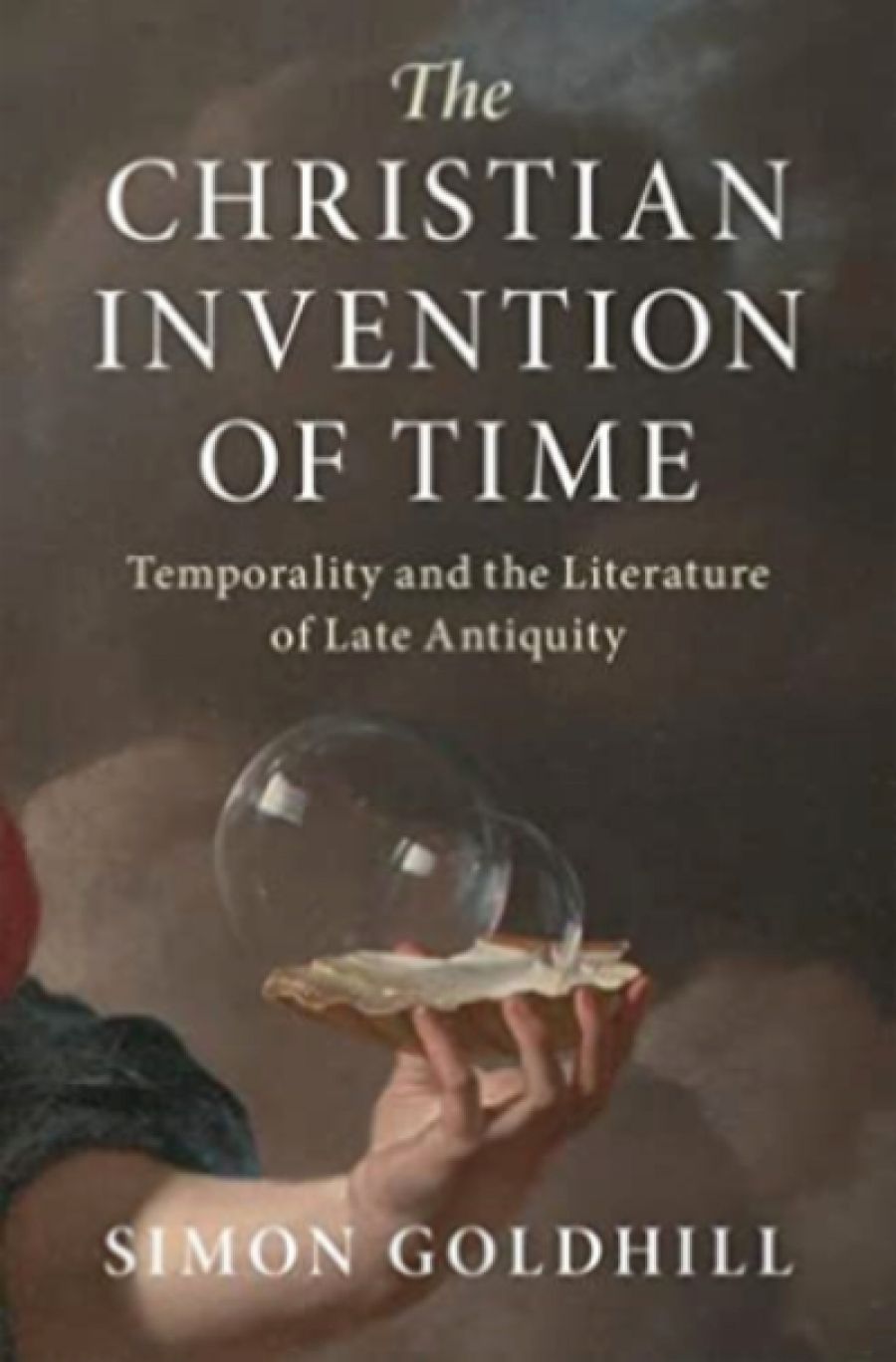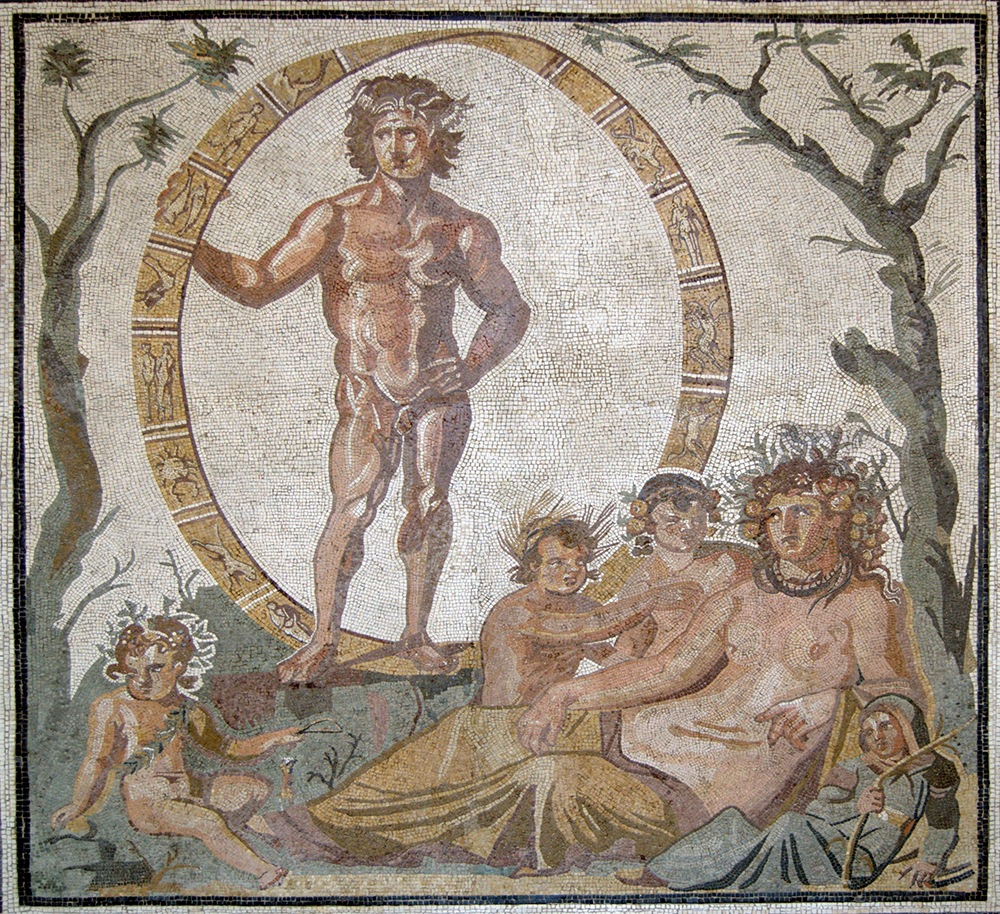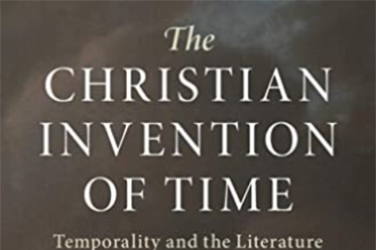
- Free Article: No
- Contents Category: History
- Review Article: Yes
- Article Title: A new history of time
- Article Subtitle: How Christianity transformed antiquity
- Online Only: No
- Custom Highlight Text:
Long gone are the days when the discipline of classics was almost exclusively focused on the golden ages of fifth-century Greek and first-century bce Roman literature and their antecedents. During the past decades, under the leadership of the indomitable Peter Brown and others, the period of later antiquity has become a burgeoning field of research. Yet it cannot be said that the study of specifically Christian thought and literature has been fully integrated into this development. Too often it has remained the domain of departments of theology and religion and of their associated vehicles of publication. In his thought-provoking and stunningly erudite new cultural history of time, the distinguished Cambridge classicist Simon Goldhill not only diagnoses this state of affairs but also seeks to remedy it.
- Article Hero Image (920px wide):

- Article Hero Image Caption: Central part of a large floor mosaic, from a Roman villa in Sentinum (now known as Sassoferrato, in Marche, Italy), c.200–250 ce. Aion, the god of eternity, is standing inside a celestial sphere decorated with zodiac signs. (Detail from a photograph taken by Bibi St Pol at the Glyptothek, Munich/Wikimedia Commons)
- Alt Tag (Article Hero Image): Central part of a large floor mosaic, from a Roman villa in Sentinum (now known as Sassoferrato, in Marche, Italy), c.200–250 ce. Aion, the god of eternity, is standing inside a celestial sphere decorated with zodiac signs. (Detail from a photograph taken by Bibi St Pol at the Glyptothek, Munich/Wikimedia Commons)
- Featured Image (400px * 250px):

- Alt Tag (Featured Image): David T. Runia reviews 'The Christian Invention of Time: Temporality and the literature of late antiquity' by Simon Goldhill
- Book 1 Title: The Christian Invention of Time
- Book 1 Subtitle: Temporality and the literature of late antiquity
- Book 1 Biblio: Cambridge University Press, $66.95 hb, 500 pp
- Book 1 Readings Link: booktopia.kh4ffx.net/5bN2bb
When studying Christian views of time, where else should one start than with the theme of God’s time? For the foundational poets of Greek literature, Homer and Hesiod, the gods live in time, but in not being subject to death or decay they do not experience it. In contrast, the opening chapters of the foundational Jewish and Christian text, the Bible, leave the reader in no doubt that God creates time, and so necessarily must himself exist outside of time. Though profound, this view might seem relatively straightforward, as it was for the Jewish thinker Philo. But as soon as key doctrines of Christian theology are adduced, God’s time can become deeply contested, as in the Arian view that there was a time that the Son was not. What happens, Goldhill asks, when the concept of God’s time changes? How does this change the relation between humans and the divine? What does this change mean for the narratives of late antiquity?
The chapter on God’s time is the first of ten which taken together constitute the first part of the book. On ten themes, each examining an aspect of temporality, they explore how the traditions of Greco-Roman and Jewish culture are transformed through the ascendancy of Christianity. In addition to God’s time, these themes include: a key moment of time, namely death; telling time; time experienced in waiting; time and exemplarity; simultaneity; timelessness of the now; time as represented in a lifetime. Any attempt to summarise the contents of these essays in a short compass would be wholly futile. Goldhill emphasises that it is not the philosophers’ theoretical discussions of time that interest him most but rather ‘how theological arguments about time come to ground the experience of time in daily practice and the engagement of individuals in a temporal world’. Such interaction between theoretical exposition and social practice gives rise to a ‘discourse of time’. This is what he succeeds in sketching in these ten chapters.
In the second part of the book, Goldhill’s focus is narrowed to a selection of Christian literary works from the fourth and fifth centuries. Thematic discussion gives way to close reading of texts, though again set against a backdrop of more than a millennium of earlier literature. The two long epic poems of the fifth-century poet Nonnus, currently receiving a good deal of attention, are treated first. The lesser known is a paraphrase in epic language and metre of the Gospel of John. In contrast to the Gospel’s ‘in the beginning was the Word’, it begins with the words ‘timeless (achronos), unattainable was the Word in the ineffable beginning’. The change is of course grist to the author’s mill. The Word shares in God’s time, which is outside time. Paraphrastic poetics is consciously adapted to the exigencies of theological controversy. Stranger altogether is the Dionysiaca, the longest poem in ancient Greek, entirely pagan in its narrative, though avoiding heathen ritualism. Here ‘all-nourishing eternity (aiôn)’ takes centre stage, ensuring the cosmos’s continuity. There is no need, Goldhill claims, to interpret the two poems as representing two differing poetic stances. Nonnus ‘provides the most vivid testimony of what the Christian invention of time can do to the narrative of epic’. Nevertheless, he also uses the term ‘hybridity’ for the author’s achievement. From a historical viewpoint, one can understand the cultural and apologetic aims of such ‘transformative poetics’, but to appreciate and enjoy them is more difficult. The close readings of the hymns of Ambrose and Prudentius, and of the histories of Sulpicius Severus and Orosius, appealed to me more.
The volume, which concludes with a fifty-page bibliography of scholarly studies, many of them very recent, is a tour de force. Its breadth and brilliance are astounding, but does it convince? The title is a patent exaggeration, perhaps prescribed by the sales department. This is evident in the book’s own oscillation between claims that Christians ‘invented’ and ‘reinvented’ time. It is in fact the latter that occurred. Drawing on the biblical tradition, Christians rejected existing notions of time, both in theory and in cultural performance, and recast them into patterns of practice, some of which are still familiar. The seven days of the week, going back to Jewish sabbath observance and the biblical creation account, and festal days of the Christian liturgical year such as Easter and Christmas, are obvious vestiges, though often not well understood in our secular age. More subtle is a lingering eschatological sense, the feeling that we are living in the end times as the consequences of our own actions threaten to overwhelm us. Goldhill’s thesis of a profound Christian transformation of time that still exerts its influence is persuasive, and this makes his study an important book.
Throughout the work, Goldhill adopts a sympathetic pose towards Christian doctrines and literature. There is the occasional hint, however, that it is not his own tradition. Just once he speaks of ‘we Jews’, noting the many different calendars that provide alternatives to the ‘imperialism’ of calculating time from the birth of Christ. Scattered through the book are brief discussions of rabbinic and talmudic discussions of time, pointing to Jewish conceptions that, too, have been transformed in the dominant Western discourse. Only the Christian doctrine of supersessionism tempts him into mild polemic. As a classicist, Goldhill is an insider, as a Jew an outsider. These contrasting perspectives have arguably sharpened his vision of a third, distinctive, and influential tradition.


Comments powered by CComment